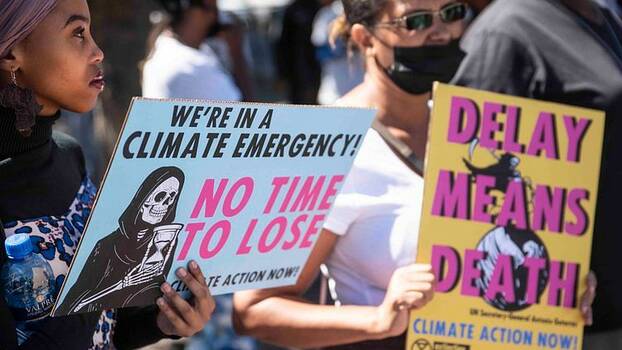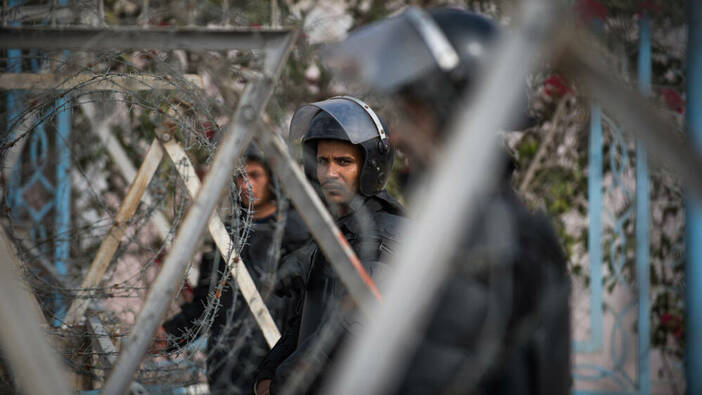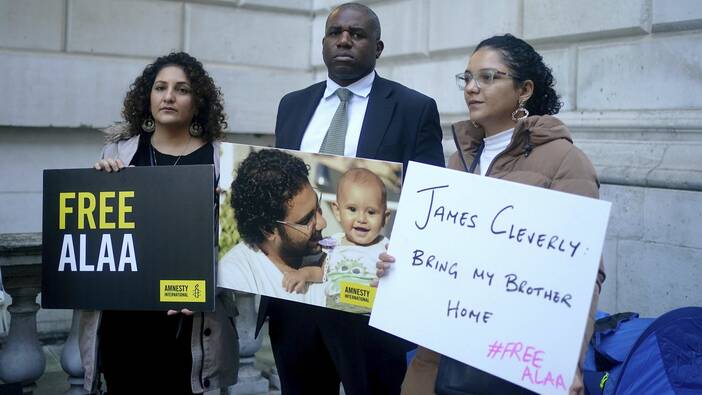
The 27th conference of the UN Framework Convention on Climate Change (COP) is set to take place in Sharm el-Sheikh, Egypt, between 6–18 November 2022, in a context marked by many overlapping problems. While Germany and Europe are busy trying to solve the energy crisis unleashed by the war in Ukraine, the climate catastrophe is advancing unimpeded. Nobody bats an eye when it comes to postponing the necessary climate protections, and new sources of fossil fuels are being sought out.
Nadja Charaby is head of the International Politics and North America units at the Rosa Luxemburg Foundation and an advisor on climate policy.
Translated by Gegensatz Translation Collective.
Multilateralism is in shambles and international climate diplomacy is miles away from the optimistic “Paris Momentum” from 2015, when heads of state congratulated themselves on reaching a new climate agreement. The location for this year’s COP — the Egyptian tourist city of Sharm el-Sheikh — is itself emblematic of this crisis of multilateralism. The Egyptian regime under Abdel Fattah El-Sisi is known for repressing criticism and opposition in civil society, in addition to committing countless human rights violations, many of which impact (left-wing) activists.
The year 2022 will be added to the list of years characterized by distressing climate developments, the impacts of which have even been felt in Europe for a number of years already. This summer was the hottest on record, with recorded temperatures in August reaching 0.8 degrees more than those from August 2021. While some regions were hit by extreme drought, others experienced above-average rainfall — a pattern usually more characteristic of countries in the tropics.
Other regions of the world were also hit with extreme weather events caused by climate change. The countries impacted by these events are now facing an intensifying global polycrisis which consists of mounting debt, food insecurity and the possibility of famine, the effects of the coronavirus pandemic, inflation, and an energy crisis — all of which are being exacerbated by the war in Ukraine.
The flood disaster in Pakistan is a particularly grim example of this sequence of events. After about four months of flooding, the country is in a dire situation. The World Health Organization warns that this disaster could lead to a widespread health crisis. Thirty-three million people are affected by the floods, two-thirds of them women and children. The follow-up costs are estimated at around 30 billion US dollars, about 10 percent of the country’s annual GDP.
Although Pakistan is one of the ten countries most drastically affected by climate change, the country is only responsible for about 1 percent of global CO2 emissions. This precarious situation is exacerbated by Pakistan’s economic crisis, which in turn has been exacerbated by the Ukraine war: Pakistan is heavily dependent on Ukraine and Russia for wheat imports, as well as on oil and gas imports for its energy supply.
Shopping for Gas Instead of Protecting the Climate
Recent developments in climate policy stand in stark contrast to these unmissable consequences of climate change. The recently published Emissions Gap Report 2022, the UN Environment Programme’s annual report on greenhouse gas emissions and their impact on climate change, shows that there is no realistic scenario under which the 1.5-degree target agreed in Paris will be met. The report argues that the world is currently on track for a 2.8 degree increase if current national climate policies continue, a figure which may be curbed to 2.4–2.6 degrees if all international pledges for greenhouse gas reductions are met. The consequences of failing to meet this goal will be brutal for the environment and for humanity.
The economic and social transformation processes that would be needed to meet the 1.5-degree target are being delayed, while others that had previously been initiated are even being reversed. The war in Ukraine has also triggered an energy crisis with potential supply bottlenecks and enormous price increases, and we are consequently observing a re-emergence of reliance on fossil and nuclear energies. The German government and the European Union are setting a poor example in this regard.
The most recent developments can be best described as a kind of liquid gas shopping spree: in addition to countries such as Qatar, Saudi Arabia, Canada, and Israel — with which gas deals are planned or have already been concluded — African countries such as Egypt (as a location for gas terminals), Nigeria, or Senegal are looking likely to become future gas suppliers.
One outcome of the sharp rise in demand for gas in European countries is that gas delivery to poorer countries like Bangladesh or Pakistan has been postponed, since European consumers pay higher prices. On top of that, the sharp increase in prices has also forced these countries to take out new loans, further fuelling their debt spiral.
In previous years, the developments in Germany’s foreign climate and development policy have supported African countries, in particular, in transitioning to renewable energies. The scramble for fossil fuels now seems to counteract such goals. The blatant disregard for environmental damage that could result from the increasing demand for gas is also alarming.
The Key Issue: Financing
This is the context in which the World Climate Conference, labelled the “African COP”, is currently taking place in Sharm el-Sheikh. Expectations are high that the problems and challenges facing the African continent will take centre stage. With this in mind, the head of the African Development Bank Akinwumi Adesina has stated, “As we go to Sharm el-Sheikh, my message is this: Africa is suffering what it didn’t cause. The developed world, a long time ago, promised 100 billion dollars per year in support of climate finance for developing countries. What we get now is a lot of talk and zero financing. It’s time to pay up because Africa is suffering tremendously from the impact of climate change. It’s Africa’s COP, so let’s deal with Africa’s problems by putting the money on the table.”
The issue of climate finance will also play a central role at this year’s COP. More empty promises from developed countries will be heard, promising to deliver on the 100 billion dollars per year they already pledged, but what will be crucial is figuring out how to free up more of that money to use for adaptation measures.
Currently, most of the funds go into greenhouse gas reduction — i.e. mitigation measures. Considering the urgent need for funds (and technologies) for climate change adaptation, especially in poorer countries, a decision was made at the COP26 that by 2025, the amount of funding earmarked for this purpose in 2019 would be doubled.
Although Germany likes to praise itself for the pioneering role it plays in climate and adaptation financing — with sometimes rather sanguine calculation methods — the figures show a different picture: at the G7 summit in June of this year, Chancellor Scholz promised to increase the budget for climate financing to 6 billion euro by 2025. However, in reality the figures remain below the 2021 level, with 4.3 billion euro in the federal budget for 2022 and 2023 each. This sends a signal of stagnation to the international community.
What’s more, the federal budget currently does not include any plans to create a financial institution dedicated to climate loss and damage, something which is central in international climate negotiations. In fact, the budget does not include any funding for loss and damage at all.
Foreign Minister Baerbock has acknowledged the importance of responding to the massive and ongoing consequences of climate change, which are already causing destruction, human suffering, and displacements. However, the German government prefers to circumvent the demand for funding via the Framework Convention on Climate Change or by implementing a compensation mechanism through its own (less binding) initiatives, such as the Global Shield against Climate Risks, which was also announced at the G7 summit.
In principle, there is nothing wrong with such bilateral or multilateral funds, but these do not automatically mean that more funding will be mobilized, but rather acts as a pricing in of the 100-billion target — as is the case with the Global Shield against Climate Risks. The insurance premiums that would have to be paid by the people in the affected regions are a questionable aspect of this solution.
It is crucial to recognize that the bureaucratic hurdles often make it nearly impossible for many affected people to actually collect the payments of the insurance benefits. Recent cases in Florida also show that insurance premiums are becoming increasingly expensive, partly due to the increased climate risk, which has resulted in some insurance companies leaving the affected regions.
Money for Climate Damages and the Danger of False Allies
It is thanks to many years of dedicated lobbying by affected countries and civil society actors that climate loss and damage will feature so prominently (and hopefully successfully) in the negotiations at this year’s climate conference. Egypt, as the country presiding over COP, has already taken up this issue and will likely present itself as an advocate for African and other affected countries. The demand for climate reparations, which can include compensation for loss and damage, is one of the core demands of the climate movement. It is closely linked to the demand that industrial countries pay a type of historical debt for the damages caused by colonialism and the climate crisis.
At the same time, a perspective grounded in climate justice would always prioritize the interests of affected and vulnerable communities. It falls on civil society to uphold this demand. There can be no talk of climate justice when dictatorial regimes like Egypt’s get rich by financing climate loss and damage. Nor will the successful creation of a financial facility be sufficient for achieving climate justice: for while civil society stands alongside el-Sisi’s negotiators beaming with joy at the end of the COP, tens of thousands of people will still be held as political prisoners in the country, and human rights violations and state repression will still be rampant.
After last year’s COP in Glasgow finally addressed one of the many elephants in the room at the conference — ending fossil fuels — the question arises as to whether the global political situation will cause major setbacks at this year’s COP.
Representatives of the German government have repeatedly emphasized at various meetings in the run-up to the COP that the negotiations must prioritize the reduction of greenhouse gases. Considering recent decisions made by the German government regarding energy policy — such as lifetime extensions for coal-fired power plants, the fast-paced construction of LNG terminals, international gas purchases, subsidies for gas importers, all in exchange for an expansion of renewable energies at too slow a pace — the foreign minister’s ambitious foreign climate policy is likely to lose some of its credibility vis-à-vis international partners. It remains to be seen to what extent the proposed work programme will manage to scale up ambitions to protect the climate and achieve the 2030 mitigation target.
At any rate, for now it does not appear that the global community of nation-states is serious about pursuing the path that can prevent warming of more than 1.5 degrees.
Summit Show and Greenwashing for the Military Regime
In recent years, the UN climate conferences have always been a source of momentum for the global climate justice movement. At the respective conference sites, alternative summits, large demonstrations, and important networking events took place in parallel to the COP, and these were largely initiated or attended by local activist movements.
This year, the Sharm el-Sheikh location symbolizes a form of climate diplomacy that is far removed from those affected by climate change. Egyptian President el-Sisi’s regime is known for ruling the country with harsh repression and human rights violations. Sharm el-Sheikh is virtually inaccessible to the Egyptian population, and the alternative summits and climate change demonstrations that are so important to left-wing and progressive actors will not take place locally — or if they do, they will be subject to strict regulations.
With a pompous summit show sponsored by Coca-Cola, among others, the el-Sisi regime will use the COP27 as a means of “greenwashing” and present itself as a model country for sustainable energy production, green tourism, and as a voice for the countries affected by the climate crisis. Legitimate concerns of the Global South, such as those regarding climate loss and damage, run the risk of being instrumentalized by the Egyptian presidency to uphold its image as climate change champion.
Undoubtedly, the regime will try to make it appear that the conference has broad support from civil society as well. For example, Egypt has requested that there be special admissions for observers from African countries this year. Over 50 organizations, mostly Egyptian, have applied to fill these positions. However, this has raised the question as to why these observers should participate only in this COP and not in future ones. In any case, civil society in the MENA region has been severely underrepresented in climate negotiations to date.
What is impressive is the tireless commitment of Egyptian activists, who in recent months have consistently urged the international climate movement that no matter how important their commitment to climate justice is, the situation faced by Egyptian activists and political prisoners must be remembered, whether through the Free Alaa campaign or the appeal to uphold open civic space during COP. The recent expressions of solidarity from prominent climate activists have been long in the making, but are now undoubtedly a part of the picture. The real challenge will be how to implement this solidarity in Sharm el-Sheikh itself and what measures the Egyptian regime will take to contain political opposition after COP.
The German government does not seem to have found a convincing way to address this concern. As illustrated by the government’s response to a question by Die Linke member of parliament Heidi Reichinnek — part of the government’s firm plan in upholding the rights of political prisoner Alaa Abd El-Fattah is for Luise Amtsberg, the Federal Government Commissioner for Human Rights Policy and Humanitarian Aid, to send out a tweet on the subject.
The UN climate conferences, and their decisions, are far from where the necessary measures to curb the climate catastrophe will be decided. The outcomes of negotiations have been dictated by national economic interests, resulting in a drifting away from the purpose of curbing climate catastrophe.
This year, a number of decentralized gatherings and actions initiated by social movements and affected communities will once again take place to protest this state of affairs, to represent Africa’s interests from an African perspective, and to develop substantive demands. On 12 November, a broad alliance led by African and Arab organizations, the COP27 Coalition, is calling for decentralized actions.
There will also be opportunities to protest in Germany. While the German government will try to make its climate policy seem exemplary on the international stage, in reality the village of Lützerath is set to be evicted to expand coal mining in the Rhenish lignite mining region, and the demolition of wind turbines has already begun. The All Villages Remain alliance has called for a demonstration in Lützerath on 12 November. Each country’s real climate policy must be judged at a local level — and the case of Lützerath attests like nothing else to Germany’s climate policy failure.


